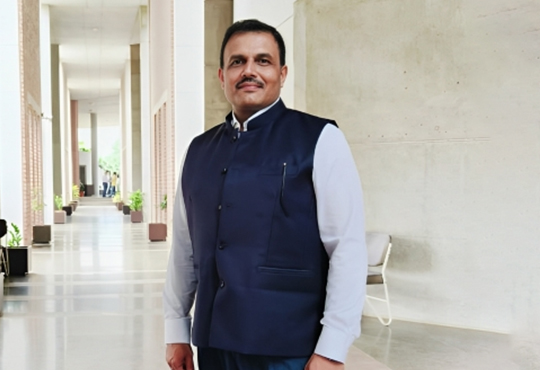Practice Ready Legal Education In India
 Dr. Sairam Bhat, Professor of Law, National Law School of India University, in an interaction with Higher Education Review, shares his views and thoughts on how effective Indian moot courts, legal aid clinics, and internships are in ensuring practice-ready legal education as well as how Indian law schools can incorporate more industry-based curricula to support practice readiness.
Dr. Sairam Bhat, Professor of Law, National Law School of India University, in an interaction with Higher Education Review, shares his views and thoughts on how effective Indian moot courts, legal aid clinics, and internships are in ensuring practice-ready legal education as well as how Indian law schools can incorporate more industry-based curricula to support practice readiness.
Dr. Sairam Bhat is a Professor of Law at NLSIU, Bengaluru, and Co-Director of CEERA. A noted scholar in Environmental Law, Contracts, and PPP, he has held global fellowships, authored key legal texts, and advises several government and private bodies. He also serves as Chief Editor of leading legal journals published by NLSIU.
With the rise of specialized legal domains like cyber law and fintech regulation, how well are Indian legal education programs preparing students for real-world legal practice?
Indian legal education is evolving by incorporating specialized fields like cyber law, fintech, and blockchain, as mandated by the Bar Council of India. This modernization equips students for real-world and digital legal challenges. Crucially, law colleges emphasize critical thinking, enabling students to analyze complex legal issues deeply. Professors with practical experience enhance learning by bridging the gap between theory and practice, fostering analytical skills and ethical reasoning. Faculty Development Programs further ensure educators stay updated, creating a dynamic and comprehensive legal education system. UGC’s introduction of Professor of Practice is a good step in this direction.
As experiential learning gains momentum globally, how effective are Indian moot courts, legal aid clinics, and internships in ensuring practice-ready legal education?
Experiential learning is the heartbeat of legal education in India, empowering students through moot courts, internships, client counselling, and arbitration competitions. These practical platforms sharpen critical thinking, drafting skills, and effective communication while grounding students in real-world legal scenarios. Institutions like the National Legal Services Authority and its state and district counterparts actively support these initiatives, ensuring meaningful exposure and opportunities. Legal aid clinics and moot court rooms, established in most colleges, bridge the gap between theory and practice, fostering a strong pro bono ethic among future lawyers. State financial support for international moot participation further motivates students to excel globally. This comprehensive approach not only fosters legal expertise but also cultivates a profound commitment to justice and social responsibility. Indeed, experiential learning cultivates well-rounded legal professionals who are prepared to meet the challenges of a dynamic legal landscape. However, the core to ensuring practice ready legal education is to systematically introduce right from the first year onwards, Chamber practice as a part of curriculum.
In light of the Bar Council’s emphasis on quality, how can Indian law schools incorporate more industry-based curricula to support practice readiness?
The Bar Council of India’s visionary emphasis on integrating emerging fields such as cyber law, fintech regulations, and blockchain technologies marks a transformative moment for Indian legal education. To truly realise this vision, law schools must pivot from traditional, marks-driven pedagogy towards a dynamic, industry-responsive curriculum that prioritises practical skills and real-world readiness. Embedding mandatory problem solving exercises, active participation in Legal aid clinics and developing paid internships for Chamber practice within the academic framework will not only deepen students’ understanding but also cultivate critical thinking, ethical awareness, and professional agility. This holistic approach bridges the gap between theory and practice, preparing students to navigate and shape the rapidly evolving legal landscape with confidence and competence. As educators and mentors, we must champion this shift, fostering a generation of lawyers who are not just scholars but innovators and problem-solvers, ready to lead in the digital era.
What role should legal professionals and law firms play in shaping curriculum reforms aimed at producing practice-ready law graduates in India?
The symbiotic relationship between legal professionals, law firms, and academic institutions is pivotal in cultivating practice-ready law graduates equipped to meet contemporary legal challenges. By offering internships, special lectures, drafting competitions, research collaborations, and article writing opportunities, practitioners actively contribute to bridging the often-cited gap between theoretical knowledge and practical application. Moreover, the transition of seasoned advocates into academia enriches the pedagogical landscape, infusing classroom discourse with nuanced insights drawn from real-world experience, thereby enhancing both the practical and theoretical dimensions of legal education. This collaborative paradigm facilitates a continuous feedback loop wherein universities, informed by practitioners’ frontline experiences, can critically assess and recalibrate curricula to address deficiencies and emerging needs in legal training. Such an integrative approach not only sharpens students’ analytical and drafting skills but also fosters professional ethics and adaptability, ultimately producing graduates who are intellectually agile and practice-ready. In essence, this partnership embodies a forward-looking model of legal education—one that is responsive, interdisciplinary, and deeply attuned to the evolving demands of the legal profession.

.jpg)